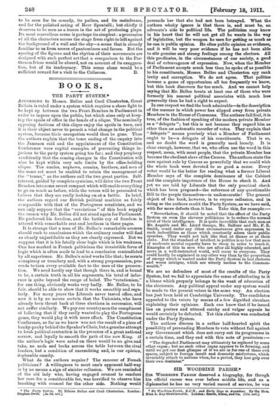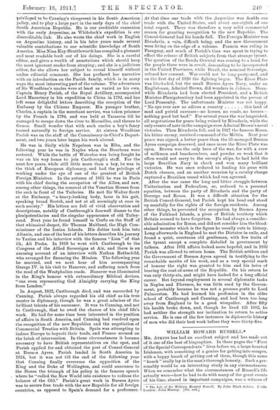SIR WOODBINE PARISH.*
Sin WOODBINE PARISH deserved a biography, for though his official career was over before middle life, and as a diplomatist he has no very varied record of service, he was
• Sir Woodbine Parish, ff.C.H., and Early Days in Argentina. By the Hon, Nina L. Say-Shuttleworth. London: Smith, Elam., and Co. firs. net.] -privileged to be Canning's vicegerent in his South American policy, and to play a large part in the early days of the chief South American Republic. He is our creditable connexion with the early Argentine, as Whitelock's expedition is our discreditable link. He also wrote the chief work in English on Argentine history, and in his later years made several valuable contributions to our scientific knowledge of South America. Miss Nina Kay-Shnttleworth has compiled a pleasant and most readable book out of his doings. She is a careful editor, and gives a wealth of annotations which should keep the most ignorant reader from straying ; and she is a judicious editor, for she allows her subject to reveal himself without undue editorial comment. She has prefaced her narrative with an introduction on the Parish family, which is in many ways the most interesting part of the volume. The adventures of Sir Woodbine's uncles were at least as varied as his own. Captain Henry Parish, of the Royal Artillery, accompanied Lord Macartney in his expedition to China in 1792, and has left some delightful letters describing the reception of the Embassy by the Chinese Emperor. His younger brother, Charles, a captain in the merchant service, was taken prisoner by the French in 1794, and was held at Tarascon till he managed to escape down the river to Marseilles, and thence to Genoa. Small wonder that with such uncles a boy's fancy turned naturally to foreign service. At sixteen Woodbine Parish was on the staff of the Commissary-in-Chief's Depart- ment, and two years later began his work abroad.
He was in Sicily while Napoleon was in Elba, and the following year he was in Naples when the Bourbons were restored. While the battle of Waterloo was being fought he was on his way home to join Castlereagh's staff. For the next few years, while still little more than a boy, he was in the thick of European diplomacy, and had the privilege of working under the eye of one of the greatest of British Foreign Ministers. In the autumn of 1815 be was in Paris with his chief during the occupation of the Allies, and saw, among other things, the removal of the Venetian Horses from the arch in front of the Tuileries. He met Sir Walter Scott at the Embassy, "a heavy-looking body, lame in his gait, speaking broad Scotch, and not at all seemingly at ease in such society." His letters are full of vivid observation and descriptions, notably of Castlereagh's farewell dinner to the plenipotentiaries and the singular appearance of old Talley- rand. Next year he found himself in Corfu on the Staff of that whimsical despot, Sir Thomas Maitland, the High Com- missioner of the Ionian Islands. His duties took him into Albania, and one of the best of his letters describes his journey to Yanina and his interview with the famous " Lion " of that ilk, Ali Pasha. In 1818 he went with Castlereagh to the Congress of the Allied Sovereigns at Aix, and there is an amusing account of an interview with Nathan Rothschild, who arranged for financing the Mission. The following year he married, and we next hear of him accompanying George IV. in his visit to Hanover, and suffering much from the mud of the Westphalian roads. Hanover was illuminated in the King's honour with extraordinary Biblical devices, "one even representing God Almighty carrying the King from London."
In August, 1822, Castlereagh died, and was succeeded by Canning. Parish always regarded his old chief as his true master in diplomacy, though he was a great admirer of the brilliant talents of his successor. It was to Canning, and not to Castlereagh, that he owed the chance of his chief life's work. He had for some time been interested in the position of affairs in South America, and Canning had resolved upon the recognition of the new Republics and the negotiation of Commercial Treaties with Britain. Spain was attempting to induce Europe to boycott their trade, and France seemed on the brink of intervention. In these circumstances it became necessary to have British representatives on the spot, and Parish applied for and obtained the post of Consul-General at Buenos Ayres. Parish landed in South America in 1824, but it was not till the end of the following year that Canning finally overcame the opposition of the King and the Duke of Wellington, and could announce to the House the triumph of his policy in the famous speech where he "called the New World into existence to redress the balance of the Old." Parish's great work in Buenos Ayres was to secure free trade with the new Republic for all foreign countries, as opposed to Spain's demand for a preference. At that time our trade with the Argentine was double our trade with the United States, and about one-eighth of our total export. There was therefore a very solid commercial reason for granting recognition to the new Republic. The Consul-General had his hands full. The Foreign Minister was Rivadavia, a vain, difficult being, and the new Government were living on the edge of a volcano. Francia was ruling in Paraguay, and much of Parish's time was spent in trying to effect the release of British subjects from that strange tyrant. The question of the Banda Oriental was coming to a head, for the people there were in revolt, demanding to be incorporated in the United Provinces, while Brazil, the nominal Sovereign, refused her consent. War could not be long postponed, and on the first day of 1826 the fighting began. The River Plate was blockaded, but the small Buenos Ayres Navy, under an Englishman, Admiral Brown, did wonders in defence. Mean- while Rivadavia had been elected President, and a British Minister-Plenipotentiary had been appointed in the person of Lord Ponsonby. The unfortunate Minister was not happy.
"No eye ever saw so odious a country this land of mud and putrid carcases—no horses, no roads, no houses— nothing good but beef." For several years the war languished, all negotiations for peace being ruined by Rivadavia, while the only events of note in the campaign were Admiral Brown's naval victories. Then Rivadavia fell, and in 1827 the famous Rosas, his bitter enemy, received command of the Militia. Next year peace was signed, a better peace than the ill-managed Buenos Ayres campaign deserved, and once more the River Plate was open. Brown was the only hero of the war, for with a crew of milkmen and beachcombers, and powder so weak that it often would not carry to the enemy's ships, he had held the large Brazilian Navy in check and won many brilliant victories. He was once reduced to loading his guns with Dutch cheeses, and on another occasion by a cavahy charge captured a Brazilian vessel which had run aground.
After the war came the long and bitter struggle between Unitarianism and Federalism, or, reduced to a personal equation, between the party of Rivadavia and the party of Dorrego and Rosas. It was a difficult situation for the British Consul-General, but Parish kept his head and stood up manfully for the rights of the foreign residents. Among other things, he prevented the occupation by Buenos Ayres of the Falkland Islands, a piece of British territory which Britain seemed to have forgotten. He had always a consider- able admiration for Rosas, and did not consider him the blood- stained monster which is the figure he usually cuts in history. Long afterwards in England he met the Dictator in exile, and found a quiet, courteous old gentleman, with few traits of the tyrant except a complete disbelief in government by talkers. After 1831 affairs looked more hopeful, and in 1832 Parish was allowed to return home. The British settlers and the Government of Buenos Ayres agreed in testifying to the remarkable merits of his work, and as a very special mark of honour the right was granted to him and his heirs of bearing the coat-of-arms of the Republic. On his return he was only thirty-six, and might have looked for a long official career. But beyond employment in several diplomatic tasks in Naples and Florence, -he was little used by the Govern- ment, probably because he was not a persona grata to Lord Palmerston. He bad learned his profession in the older school of Castlereagh and Canning, and had been too long away from England to be a good wirepuller. After fifty his health broke down, and, though he lived till 1882, he had neither the strength nor inclination to return to active service. He is one of the few instances in diplomatic history of men who did their best work before they were thirty-five.







































 Previous page
Previous page